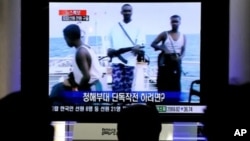South Korea is defending its use of force to free sailors on its ships held by pirates.
South Korean Foreign Minister Kim Sung Hwan is brushing off concern from some quarters, including European naval forces, that taking military action against pirates endangers kidnapped mariners.
Kim says he does not agree with such criticism.
The foreign minister tells reporters that when South Korean ships and crews are seized, Seoul will consider rescue operations to free them.
Both South Korea and Malaysia in separate actions last Friday rescued sailors held by pirates.
South Korean navy commandos freed 21 sailors and killed a number of pirates in the Arabian Sea. Five pirates were captured.
The Defense Ministry on Tuesday backed away from the idea of swapping the captured Somali pirates for the 44 crew members of a South Korea fishing trawler. Pirates seized the boat last October in Kenyan waters.
Defense Minister Kim Wan-jin on Tuesday told lawmakers it would be a "great idea" to try to conduct such an exchange. However South Korea’s government says it maintains a policy of not negotiating with pirates.
The foreign minister says the government is considering bringing the captured pirates to this country to face trial.
Foreign Minister Kim says when South Koreans are attacked and hurt, the nation has a sovereign right to prosecute the perpetrators.
Last Friday’s rescue of the crew of the chemical tanker Samho Jewelry took place 1,300 kilometers northeast of Somalia.
A United Nations report to be debated by the Security Council Tuesday says pirate raids cost countries and the shipping industry $7 billion annually, including ransoms paid. It calls for increased security and establishing a U.N.-backed international court to try piracy cases.
The unprecedented South Korean rescue, involving one of its destroyers, a helicopter and an Omani patrol ship, came after domestic criticism that paying ransom would encourage pirates to target South Korean vessels.
Malaysia’s navy conducted a similar mission, taking back a chemical tanker from Somali kidnappers in the Gulf of Aden. All 23 members of the crew of the MT Bunga Laurel were freed and seven pirates were captured.
The European Union Naval Force, with four ships on patrol off the Horn of Africa, says it will not conduct rescue actions because they could put hostages in worse peril.
John Burnett, author of Dangerous Waters, a book that looks at modern piracy, has mixed views on that stance.
"That may be the only way that piracy can be curbed at this point because nothing else has been done to put an end to it," he said. "However, I'm sure that there's a lot of nervous sailors out there, at this point, who are going through the Gulf of Aden and are worried, whether or not, if they do get attacked there's going to be some commando raid that will put their lives in jeopardy."
There have been reports that Somali pirates are threatening to target South Korean ships and kill their crews in revenge for Friday’s raid. But Burnett says when pirates seize vessels they usually do not know where they or their crews originate.
International maritime agencies say pirates in Somalia hold more than 25 ships and 600 people hostage.





